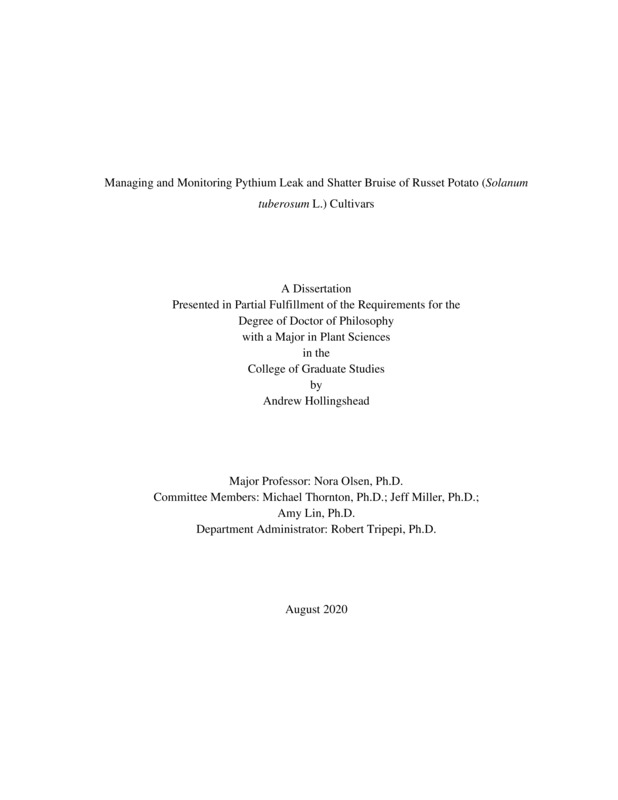Managing and Monitoring Pythium Leak and Shatter Bruise of Potato (Solanum tuberosum L.) Cultivars
Hollingshead, Andrew. (2020-08). Managing and Monitoring Pythium Leak and Shatter Bruise of Potato (Solanum tuberosum L.) Cultivars. Theses and Dissertations Collection, University of Idaho Library Digital Collections. https://www.lib.uidaho.edu/digital/etd/items/hollingshead_idaho_0089e_11878.html
- Title:
- Managing and Monitoring Pythium Leak and Shatter Bruise of Potato (Solanum tuberosum L.) Cultivars
- Author:
- Hollingshead, Andrew
- ORCID:
- 0000-0002-5260-1057
- Date:
- 2020-08
- Keywords:
- Biological control agents Cultural controls Pythium ultimum Shatter bruise
- Program:
- Plant, Soil and Entomological Sciences
- Subject Category:
- Plant sciences; Plant pathology
- Abstract:
-
Leak is a devastating storage disease caused by the opportunistic pathogen, Pythium ultimum var. ultimum. The disease is identified by dark grey lesions in the flesh of the potato that exude water from damaged cells. Oospores or other propagules typically infect potatoes through mechanical wounds (shatter bruises) during harvest. The disease contributes to loss in storage but also creates ideal environments for secondary pathogens to further decay. It is recommended to manage leak by implementing cultural controls such as harvesting at tuber temperatures below 21°C, avoiding bruise, and establishing a good skin set. The objectives of this research were to examine these general recommendations for several russet cultivars and understand why cultivars may differ in leak and bruise susceptibility and recommend means to prevent both. Specific studies evaluated (1) the effects of both pulp and storage temperature on leak susceptibility among several russet cultivars, (2) the association of leak development of russet cultivars and tuber shatter bruise and mechanical failure properties, (3) the efficiency of bacterial antagonists and other post-harvest fungicides in managing leak, and (4) methods and tools for bruise mitigation programs.
Although potato cultivars vary in susceptibility to leak, the standard recommended control method for all cultivars is to harvest potatoes when pulp temperatures are below 21°C. However, potatoes may be harvested with higher than ideal pulp temperatures or a cultivar may warrant stricter recommendations. Several russet cultivars were equilibrated to pulp temperatures of 12.8, 15.5, 18.3, and 21.1°C, bruised and inoculated with P. ultimum then evaluated four days later. To test how leak development in russet cultivars would respond to a change of temperature in storage, tubers were equilibrated to pulp temperatures of 15.5 and 21.1°C, bruised and inoculated then stored at 12.8, 15.5, 18.3, and 21.1°C for four days. Leak susceptibility was influenced by pulp temperature but the storage temperature had an overriding effect if altered from the original pulp temperature. Leak susceptibility differed among cultivars and by temperature. The results highlight the importance of harvesting susceptible cultivars when pulp temperatures are below 15.5°C or cooling tubers below 15.5°C when adequate refrigeration or cooling air are available to rapidly modify temperatures in storage.
Pythium ultimum infects a tuber via wounds or shatter bruises, which occur during mechanical harvesting and handling. To evaluate if cultivar susceptibility to leak is related to shatter bruise susceptibility and tuber mechanical failure properties, tubers were bruised and inoculated to mimic the state of potatoes during harvest. Cultivars varied in susceptibility to leak development, shatter bruise, and mechanical failure properties. Although, leak incidence was not highly correlated to shatter bruise area and number, a relationship between leak and mechanical failure properties of the tuber was observed. Shatter bruise incidence was correlated to tissue mechanical failure properties, and these measurements could provide insight into the shatter bruise potential for a cultivar. The prevalence or susceptibility of shatter bruise could not directly explain a cultivars susceptibility to leak and therefore additional research is needed to further understand the relationship between mechanical failure properties and leak.
Post-harvest fungicides can also be important tools in managing storage diseases such as leak. A mixture of bacterial control agents developed by the National Center for Agricultural Utilization Research (NCAUR, USDA-ARS, Peoria, IL) was tested for efficiency against leak compared to other commercial fungicides. The bacterial control agents varied in efficacy of leak control and were not as effective as a commercial chemical fungicide. The bacterial control agent may have contributed to the control of P. ultimum when rehydrated with a nutrient medium and mixed with the commercial chemical fungicide; however, P. ultimum control was not significantly greater than the conventional fungicide alone. Other post-harvest products studied were not effective and did not differ from the inoculated control. Biological antagonists may be an effective post-harvest tool but more research is warranted to realize its potential in managing leak alone or when mixed with conventional fungicides.
Minimizing bruise should be part of an integrated management program for storage diseases such as leak. Limiting bruise will also help maintain quality of potatoes. A bulletin was written to outline tools and protocols to monitor the potential for bruise within a potato handling operation. Tools include dipping potatoes in iodine to readily see the blue stained shatter bruises. Another tool outlined how to assess for blackspot bruise as the majority of the blackspot bruises could be visible and evaluated within 3 to 5 hours, which is earlier than previous recommendations. Instrumented spheres are another tool used to record damaging impacts that occur during harvesting and handling operations. These tools and methods help to monitor bruise and aid in making timely mechanical adjustments to further prevent bruise
- Description:
- doctoral, Ph.D., Plant, Soil and Entomological Sciences -- University of Idaho - College of Graduate Studies, 2020-08
- Major Professor:
- Olsen, Nora
- Committee:
- Thornton, Michael; Lin, Amy; Miler, Jeff
- Defense Date:
- 2020-08
- Identifier:
- Hollingshead_idaho_0089E_11878
- Type:
- Text
- Format Original:
- Format:
- application/pdf
- Rights:
- In Copyright - Educational Use Permitted. For more information, please contact University of Idaho Library Special Collections and Archives Department at libspec@uidaho.edu.
- Standardized Rights:
- http://rightsstatements.org/vocab/InC-EDU/1.0/

